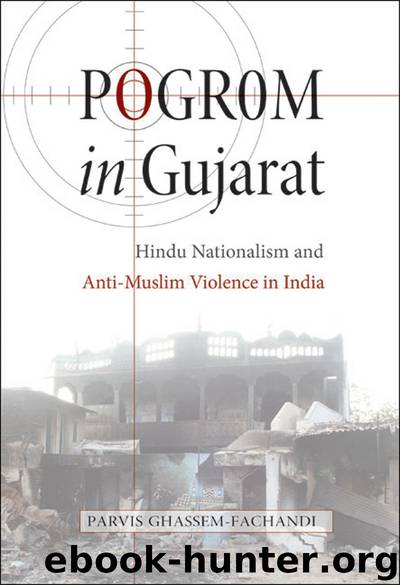Pogrom in Gujarat by Ghassem-Fachandi Parvis; Ghassem-Fachandi Parvis;

Author:Ghassem-Fachandi, Parvis; Ghassem-Fachandi, Parvis;
Language: eng
Format: epub
Publisher: Princeton University Press
Published: 2012-12-08T16:00:00+00:00
ASSIMILATING LACK
Like many of his peers, Bharat does not speak English well, and his lack of marked improvement while living with me led others to attribute his slow progress to the stigma associated with his social background. Yet, I found Bharat very astute in his selection of English words. Some listeners perceive his selective use of English simply as betraying his low educational status; despite his studies, his use of foreign words and concepts reveals a fundamental unfamiliarity with a wider English-speaking world. In this regard, he is quite unlike many bilingual professionals; at the same time, he is also unlike the large number of residents in the city who, despite weak active English skills, will nonetheless fall into what a linguistics professor in Varodara has referred to as “Gujarezi.”
Gujarezi is used mainly in Ahmedabad and Varodara in varied forms that depend on the English vocabulary and general linguistic competency of the speaker. For the most part this linguistic practice is incomprehensible to a non-Gujarati speaker, as English words are imported into Gujarati syntax and pronounced in accordance with Gujarati phonetic rules. By contrast, in Bharat’s use of English words, there is a more decided semantic shift at work, with an even stronger indigenization of concepts and words whose similarity to English can obscure differences of meaning.
Bharat has never attended a school where English is taught or taken an English-language course at the university, nor did he ever enjoy a movie in English. He takes in English words through the Gujarezi that he hears practiced on the street. His selective appropriation of new words—a practice he shares with his peers, like Pratab—is a formidable technique for incorporating the modern world of the city, as he essentially assimilates its power in order to overcome his relative lack. Although these words will not appear in standard Gujarati dictionaries, their experimental and creative use evolves into collective understandings.
For example, Bharat refers to techniques of dress and style in the city as productive of “personaliti”; to communal conflagrations, marital conflict, or sexual frustration as “tenshun”; to the wished-for outcome of job interviews, class presentations, marital negotiations with affines, or first scenes in Bollywood movies as the power of “entri”; and to all sorts of transgressive behaviors involving wasteful expenditure as “enjoi.”
As already mentioned in chapter 2, the term enjoi was widely used by young men like Bharat on the streets during the pogrom to refer to rape, looting, and the destruction of Muslim bodies and property. Initially taken from the very successful Coke commercial “Enjoy, Enjoy!” that entered India some time in the 1990s, enjoi is incorporated into typical Gujarezi constructions, such as in enjoi leva mate (in order to enjoy). Enjoi reaches into the semantics of the Gujarati verb bhogavavu (to enjoy, to suffer) and the noun bhog (pleasures, the victim of a sacrifice) and expresses the idea of excessive and wasteful consumption. The deployment of this term suggests how economic liberalization and the circulation of new goods in an atmosphere of accelerated consumption is experienced and assimilated by a younger generation.
Download
This site does not store any files on its server. We only index and link to content provided by other sites. Please contact the content providers to delete copyright contents if any and email us, we'll remove relevant links or contents immediately.
| Anthropology | Archaeology |
| Philosophy | Politics & Government |
| Social Sciences | Sociology |
| Women's Studies |
The Secret History by Donna Tartt(19052)
The Social Justice Warrior Handbook by Lisa De Pasquale(12187)
Thirteen Reasons Why by Jay Asher(8893)
This Is How You Lose Her by Junot Diaz(6877)
Weapons of Math Destruction by Cathy O'Neil(6264)
Zero to One by Peter Thiel(5786)
Beartown by Fredrik Backman(5737)
The Myth of the Strong Leader by Archie Brown(5499)
The Fire Next Time by James Baldwin(5431)
How Democracies Die by Steven Levitsky & Daniel Ziblatt(5215)
Promise Me, Dad by Joe Biden(5141)
Stone's Rules by Roger Stone(5081)
A Higher Loyalty: Truth, Lies, and Leadership by James Comey(4954)
100 Deadly Skills by Clint Emerson(4921)
Rise and Kill First by Ronen Bergman(4779)
Secrecy World by Jake Bernstein(4741)
The David Icke Guide to the Global Conspiracy (and how to end it) by David Icke(4707)
The Farm by Tom Rob Smith(4502)
The Doomsday Machine by Daniel Ellsberg(4484)
